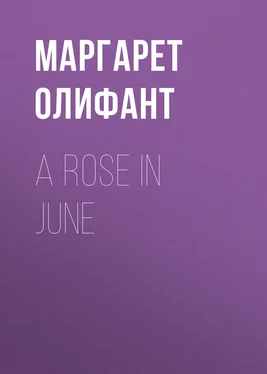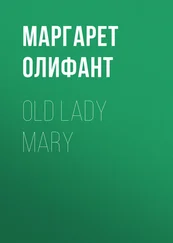Маргарет Олифант - A Rose in June
Здесь есть возможность читать онлайн «Маргарет Олифант - A Rose in June» — ознакомительный отрывок электронной книги совершенно бесплатно, а после прочтения отрывка купить полную версию. В некоторых случаях можно слушать аудио, скачать через торрент в формате fb2 и присутствует краткое содержание. Жанр: foreign_prose, literature_19, foreign_antique, на английском языке. Описание произведения, (предисловие) а так же отзывы посетителей доступны на портале библиотеки ЛибКат.
- Название:A Rose in June
- Автор:
- Жанр:
- Год:неизвестен
- ISBN:нет данных
- Рейтинг книги:4 / 5. Голосов: 1
-
Избранное:Добавить в избранное
- Отзывы:
-
Ваша оценка:
- 80
- 1
- 2
- 3
- 4
- 5
A Rose in June: краткое содержание, описание и аннотация
Предлагаем к чтению аннотацию, описание, краткое содержание или предисловие (зависит от того, что написал сам автор книги «A Rose in June»). Если вы не нашли необходимую информацию о книге — напишите в комментариях, мы постараемся отыскать её.
A Rose in June — читать онлайн ознакомительный отрывок
Ниже представлен текст книги, разбитый по страницам. Система сохранения места последней прочитанной страницы, позволяет с удобством читать онлайн бесплатно книгу «A Rose in June», без необходимости каждый раз заново искать на чём Вы остановились. Поставьте закладку, и сможете в любой момент перейти на страницу, на которой закончили чтение.
Интервал:
Закладка:
Mrs. Oliphant
A Rose in June
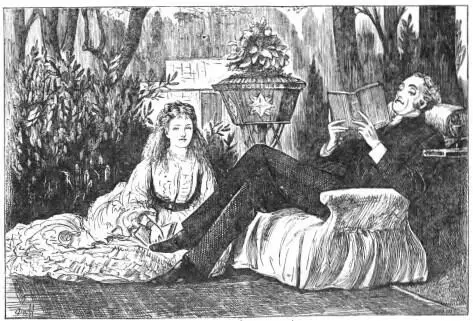
The Rose of my story was half-sitting, half-reclining at his feet.
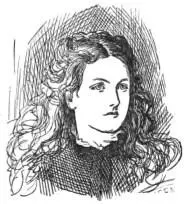
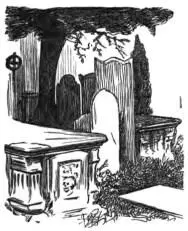
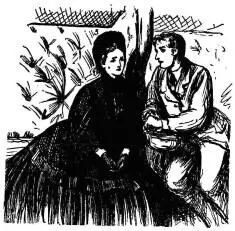
CHAPTER I
Martha, Martha, thou art careful and troubled about many things. Let the child alone—she will never be young again if she should live a hundred years!”
These words were spoken in the garden of Dinglefield Rectory on a very fine summer day a few years ago. The speaker was Mr. Damerel, the rector, a middle-aged man with very fine, somewhat worn features, a soft benignant smile, and, as everybody said who knew him, the most charming manners in the world. He was a man of very elegant mind as well as manners. He did not preach often, but when he did preach all the educated persons in his congregation felt that they had very choice fare indeed set before them. I am afraid the poor folk liked the curate best, but then the curate liked them best, and it mattered very little to any man or woman of refinement what sentiment existed between the cottagers and the curate. Mr. Damerel was perfectly kind and courteous to everybody, gentle and simple, who came in his way, but he was not fond of poor people in the abstract. He disliked everything that was unlovely, and alas! there are a great many unlovely things in poverty. The rectory garden at Dinglefield is a delightful place. The house is on the summit of a little hill, or rather table-land, for in the front, towards the green, all is level and soft as becomes an English village; but on the other side the descent begins towards the lower country, and from the drawing-room windows and the lawn, where Mr. Damerel now sat, the view extended over a great plain, lighted up with links of the river, and fading into unspeakable hazes of distance, such as were the despair of every artist, and the delight of the fortunate people who lived there and were entertained day by day with the sight of all the sunsets, the midday splendors, the flying shadows, and soft, prolonged twilights. Mr. Damerel was fond of saying that no place he knew so lent itself to idleness as this. “Idleness! I speak as the foolish ones speak,” he would say, “for what occupation could be more ennobling than to watch those gleams and shadows—all nature spread out before you, and demanding attention, though so softly that only they who have ears hear? I allow, my gentle nature here does not shout at you, and compel your regard, like her who dwells among the Alps, for instance. My dear, you are always practical—but so long as you leave me my landscape I want little more.”
Thus the rector would discourse. It was very little he wanted—only to have his garden and lawn in perfect order, swept and trimmed every morning like a lady’s boudoir, and refreshed with every variety of flower: to have his table not heavily loaded with vulgar English joints, but daintily covered, and oh! so daintily served; the linen always fresh, the crystal always fine, the ladies dressed as ladies should be: to have his wine, of which he said he took very little, always fine, of choice vintage, and with a bouquet which rejoiced the heart: to have plenty of new books: to have quiet, undisturbed by the noise of the children, or any other troublesome noise such as broke the harmony of nature: and especially undisturbed by bills and cares, such as, he declared, at once shorten the life and take all pleasure out of it. This was all he required; and surely never man had tastes more moderate, more innocent, more virtuous and refined.
The little scene to which I have thus abruptly introduced the reader took place in the most delicious part of the garden. The deep stillness of noon, was over the sunshiny world; part of the lawn was brilliant in light; the very insects were subdued out of their buzz of activity by the spell of the sunshine; but here, under the lime-tree, there was grateful shade, where everything took breath. Mr. Damerel was seated in a chair which had been made expressly for him, and which combined the comfort of soft cushions with such a rustic appearance as became its habitation out of doors; under his feet was a soft Persian rug in colors blended with all the harmony which belongs to the Eastern loom; at his side a pretty carved table, with a raised rim, with books upon it, and a thin Venice glass containing a rose. Another Rose, the Rose of my story, was half-sitting, half-reclining on the grass at his feet—a pretty, light figure in a soft muslin dress, almost white, with bits of soft, rose-colored ribbon here and there. She was the eldest child of the house. Her features I do not think were at all remarkable, but she had a bloom so soft, so delicate, so sweet, that her father’s fond title for her, “a Rose in June,” was everywhere acknowledged as appropriate. A rose of the very season of roses was this Rose. Her very smile, which came and went like breath, never away for two minutes together, yet never lasting beyond the time you took to look at her, was flowery too, I can scarcely tell why. For my own part, she always reminded me not so much of a garden-rose in its glory, as of a branch of wild roses all blooming and smiling from the bough, here pink, here white, here with a dozen ineffable tints. Her hair was light-brown with the least little curl in the world just about her forehead, but shining like satin on her pretty head; her eyes too were brown, with a dancing gleam of light in each; the delicate eyebrows curved, the eyelashes curved, the lips curved, all wavy and rounded. Life and light shone out of the girl, and sweet, unconscious happiness. In all her life she had never had any occasion to ask herself was she happy. Of course she was happy! did not she live, and was not that enough? Rose Damerel was the last dainty ornament of his house in which her father delighted most. He had spoiled her lessons when she was younger because of his pleasure in her and her pretty looks, and he interfered now almost altogether with that usefulness in a house which is demanded by every principle of duty from the eldest daughter of a large family; for alas! there was a large family, a thing which was the cause of all trouble to the Damerels. Had there been only Rose, and perhaps one brother, how much more pleasantly would everything have gone! In that case there might have been fewer lines in the brow of the third person whom Mr. Damerel spoke to, but whom the reader has not yet seen.
What Mrs. Damerel was like in her June of life, when she married her husband and was a Rose too, like her daughter, it is difficult to tell. Life, which often makes so little real change, brings out much that is latent both of good and evil. I have said she was a Rose, like her daughter—and so, indeed, she was still, so far as formal documents went; but, somehow or other, the name had gone from her. She had acquired from her husband, at first in joke and loving banter of her early cares of housekeeping, while they were still no more than married lovers, the name of Martha, and by degrees that name had so fastened to her that no one recognized her by any other. Nobody out of her own family knew that it was not her name, and of course the children, some of whom were indignant at the change, could not set it right.
Читать дальшеИнтервал:
Закладка:
Похожие книги на «A Rose in June»
Представляем Вашему вниманию похожие книги на «A Rose in June» списком для выбора. Мы отобрали схожую по названию и смыслу литературу в надежде предоставить читателям больше вариантов отыскать новые, интересные, ещё непрочитанные произведения.
Обсуждение, отзывы о книге «A Rose in June» и просто собственные мнения читателей. Оставьте ваши комментарии, напишите, что Вы думаете о произведении, его смысле или главных героях. Укажите что конкретно понравилось, а что нет, и почему Вы так считаете.
